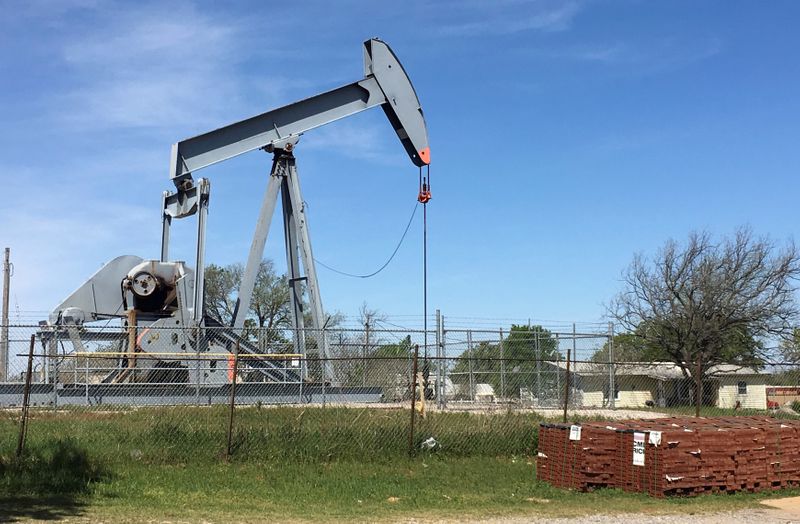(Reuters) – Oklahoma’s energy regulator said on Wednesday that oil producers could close wells without losing their leases, the first victory for struggling U.S. companies seeking relief from states after the market crash.
Several U.S. states have considered aiding oil companies, many of which were already hurting before demand tanked during coronavirus pandemic lockdowns. That, and ballooning supply, sent U.S. prices into negative territory for the first time ever on Monday.
In an emergency order, the state energy regulator said oil companies could consider their unprofitable production economic waste, allowing oil and gas producers with money-losing wells to retain leases that could otherwise be voided if they halted output.
“There was no way for Oklahoma and other U.S. producers to anticipate and plan for up to 30 million barrels per day of consumption to disappear within just a few weeks,” Oklahoma Corporation Commissioner Dana Murphy said in a statement.
U.S. production reached a record-high of near 13 million bpd in late 2019, but the pandemic has cut worldwide consumption by 20% to 30%, or up to 30 million bpd. Supply cuts from producers led by Saudi Arabia only amount to about 10 million bpd, while private companies in the United States and elsewhere are scrambling to close wells to avoid being stuck with oil that they cannot profitably sell.
Oklahoma was the fourth-largest oil producer in 2019, with output of about 580,000 bpd, but its production costs are among the highest in the country. More than half of the rigs operating in the state at the beginning of the year have been laid down, leaving just 24 currently, according to Baker Hughes figures.
Two out of three Oklahoma commissioners voted in favor of the order, enough to win approval. One commissioner, Bob Anthony, said he would not sign the order, but did not vote against.
An application to consider some production economic waste, as well as a separate application submitted by another group of producers requesting outright limits to Oklahoma’s oil output, will go before the state’s Corporation Commission on May 11.
“We are happy that the Commission is listening and is engaged in this situation. But we don’t feel like that goes far enough,” said David Little, president of the Oklahoma Energy Producers Alliance, the group that submitted the application requesting production limits.
New Mexico agreed on Tuesday to allow producers to apply to shut in output on state lands for at least 30 days, and Texas regulators also are considering mandated production cuts to halt losses. North Dakota is weighing aid for producers, but pushed back on the idea of limiting output at a meeting on Tuesday.
Crude supplies have overwhelmed global demand during the coronavirus lockdowns. On Monday for the first time ever, traders agreed to pay customers to take U.S. crude futures off their hands, and on U.S. crude futures on Wednesday fetched only about $14.60 a barrel.
For a graphic on the oil price collapse, click here:
https://graphics.reuters.com/USA-OIL/0100B5LV472/index.html
Oklahoma oil companies have slashed jobs since oil prices began collapsing last month as major Middle East producers, Russia and others abandoned a pact to cut their output.
Eddie Rongey, an Oklahoma producer who operates some 600 wells, testified that he was losing $200,000 a month by producing from “economically challenged wells,” according to the order. Rongey said the order would prevent shut-ins from jeopardizing his leases.
In Cushing, Oklahoma, the largest U.S. oil storage depot with room for about 76 million barrels, traders said this week that 100% of capacity was already contracted.
Oil production in Oklahoma’s SCOOP and STACK shale plays are some of the highest in the country at over $48 per barrel, according to data compiled by Deutsche Bank.
Texas and Oklahoma can curb oil production to prevent waste of the states’ natural resources. Both used economic waste as the rationale behind imposing restraints decades ago.
Stopping production takes time and must be done carefully to avoid damaging future output. Shut-ins also can cause an oil and gas producer to lose the right to drill under many leases.
(Reporting by Liz Hampton; Additional reporting by Jennifer Hiller in Houston; Editing by David Gregorio and Peter Cooney)
























